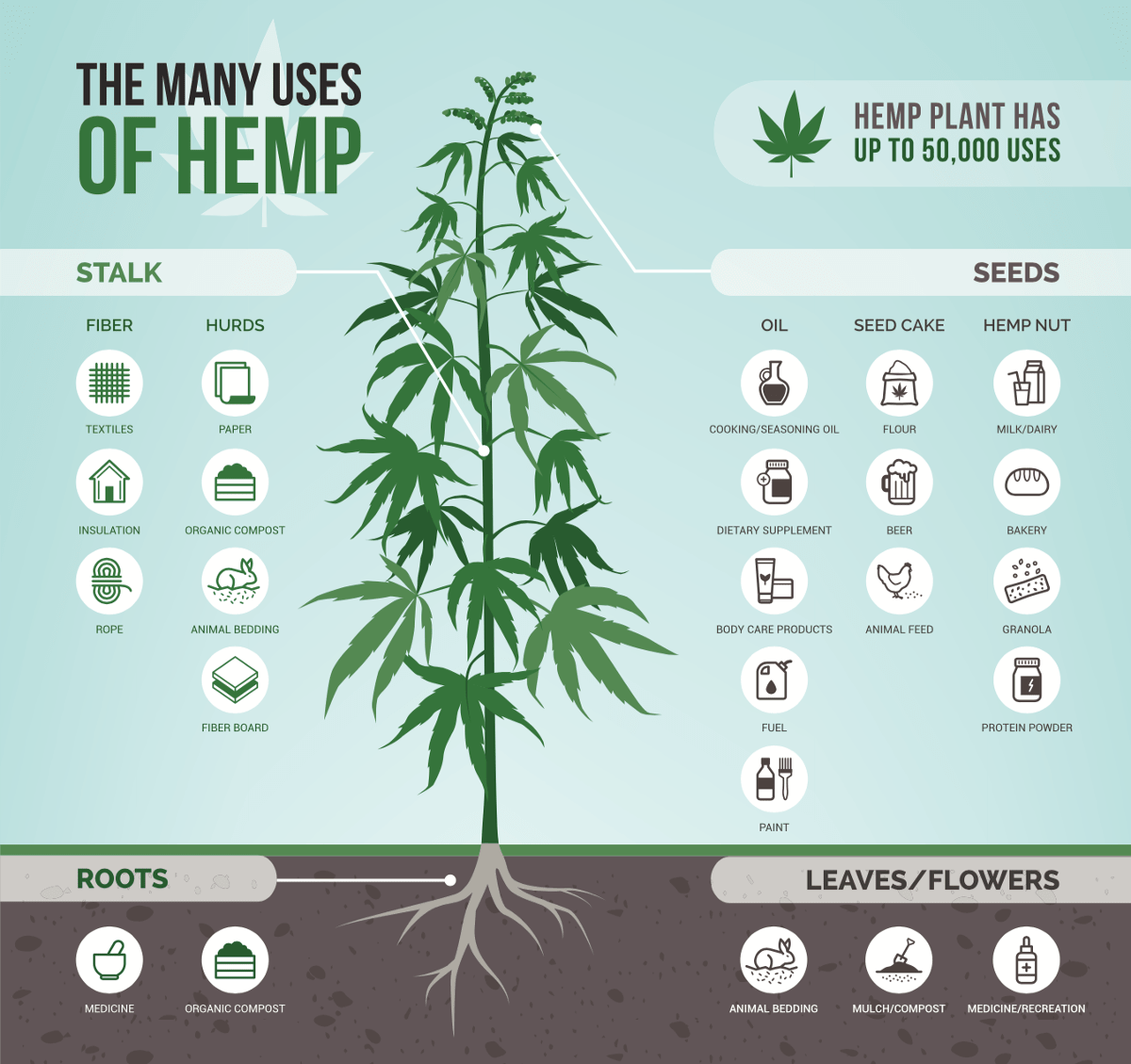What is Hemp? Industrial hemp is not marijuana and has been grown for centuries for its oil and fiber. Hemp is used in a variety of consumer products from clothing, to rope, biofuel and dietary supplements. The hemp species Cannabis sativa L. has historically been classified as a Schedule 1 Controlled Substance by the United States and regulated under the Controlled Substance Act even though the levels of delta-9-tetrahydrocannabinol, or THC, are too low in industrial hemp to have any psychoactive properties. Since the 1990s industrial plants with non-psychoactive levels of THC, below 0.3% by dry weight, have been legally grown in Canada, Australia and many parts of Europe but the US had yet to catch up. [1][2]
Cannabis sativa L. was actually legal in the United States until the Marihuana Tax Act of 1937 was filed by a congress heavily lobbied by the tobacco industry. This effectively outlawed all forms of hemp, both psychoactive and industrial. Historically, the Controlled Substances Act (CSA), 21 U.S.C. § 802(16) labeled all parts of the Cannabis sativa L. plant, with the exception of the mature stalks and ungerminated seeds, as Schedule 1 with no medical use. In 2003 the DEA overreached claiming that since it was impossible to remove all traces of THC from hemp and hemp products, that everything would need to be banned, even if it was below the 0.3% threshold. Litigation was quickly filed and in Hemp Industries Association v. Drug Enforcement Administration, 375 F.3d 1012 (9th Cir. 2004), it was found that the DEA was outside its authority. This paved the way for the Farm Bill of 2018.[3]2
The Agricultural Act of 2014 finally defined industrial hemp as strains of Cannabis sativa L. that had less than 0.3% of THC present by dry weight but it missed the mark in that it left it up to the individual states to establish programs around agricultural growth. The 2018 Farm Bill decriminalizes both industrial hemp and products made from Cannabis sativa L. by removing it from the Controlled Substances Act and putting it outside of the DEA’s purview. This means that products such as seed oil, CBD, textiles and fibers made with hemp are now decriminalized, opening the door for whole new classes of agriculture and consumer products. The 2018 bill also lists hemp as a covered commodity under crop insurance and directed the Federal Crop Insurance Corporation board to streamline the process for developing hemp policies. Given the excitement and uncertainty around the market potential for hemp, the 2018 bill also requires the Secretary of Agriculture to conduct a study of the hemp-related agricultural pilot programs implemented under the 2014 farm bill, along with any other agricultural and academic research on the subject, to determine the economic viability of a domestic hemp market.13
Decriminalizing industrial hemp has opened the doors for new agricultural opportunities, creating jobs and providing a new cash crop for US farmers. The US Farm Bureau estimates that in the last three years hemp acreage has increased from 9,800 in 2016, to 26,000 in 2017, to 78,000 acres in 2018. Over the past few decades, hemp imports have been growing, reaching a high of nearly $80 million worth in 2015, before declining to just under $70 million worth in 2017. Nearly two-thirds of the value of hemp imports was derived from hemp seeds. As is the case with many U.S. imports, Canada is the largest supplier of hemp to the U.S., accounting for as much as 90 percent. [4]
While the 2018 Farm Bill provides the U.S. with very good news for the agricultural future, there is still some gray areas that need to be sorted out in the regulations. Nine states never put programs in place around the growing of industrial hemp so these states will be slow to see the economic benefit from a new crop. Also, the treatment of CBD is still uncertain since it can be derived from both industrial hemp and Cannabis sativa containing psychoactive levels of THC. The DEA has suggested to keep all CBD as a Schedule 1 drug since they claim they do not have the resources to test every product that they receive complaints about. Both economic and political experts see these regulations being ironed out in favor of industrial hemp and all hemp products, such as CBD, but it appears we still have a ways to go in order to catch up with much of the rest of the developed world.
[1] 2018 Farm Bill Provides a Path Forward for Industrial Hemp. www.fb.org. 2.2019
[2] 2018 Farm Bill: Opportunities in Hemp. www.cannabisbusinesstimes.com. 1.2019
[3] How Hemp and the Farm Bill May Change Life as You Know It. www.forbes.com. 12.18
[4] US Farm Bureau Infographic. Vote Hemp. 12.2018





